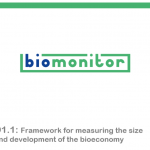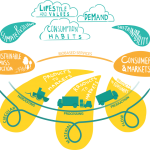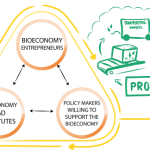Category: Regional potential, bioeconomy strategies and action plans
Framework for measuring the size and development of the bioeconomy
This deliverable develops a conceptual analysis framework for quantifying and analysing the development of the EU bioeconomy in the BioMonitor project. This includes defining the scope of the bioeconomy to be considered within the BioMonitor project in terms of sectors and products involved, geographical coverage, time period, as well as the focus topics. The EC’s 2018 Bioeconomy Strategy Update recently confirmed that the bioeconomy is high on the political agenda and includes three main action areas, namely 1. Strengthening and scaling-up the bio-based sectors, unlocking investments and markets; 2. Deploying local bioeconomies rapidly across Europe; 3. Understanding the ecological boundaries of the bioeconomy. These action areas constitute an important guidance for how the scope or contents of the monitoring and measuring framework of BioMonitor must look like.
The ‘bioeconomy’ has several related terms, such as ‘bio-based economy’, ‘green economy’ and ‘circular economy’. There are clear synergies between especially the bioeconomy and circular economy concepts, such as cascading use of biomass. Factors have been determined to understand what the development of the bioeconomy drives. Knowing these driving forces provides important information for monitoring activities. The sectors covering the bioeconomy have been identified as well as a set of indicators that are going to be quantified and monitored. In our framework measuring developments will in particular focus on the bio-based sectors, because the traditional part of the bioeconomy can already be monitored. The selected indicators commit to the EU Bioeconomy Strategy objectives and are conform with findings from previous studies and stakeholder consultations. Additionally, a several new indicators have been suggested. They are related to measuring the impact of changes in supply, demand drivers, resource availability and policies on sustainability goals.
SHERPA – Sustainable Hub to Engage into Rural Policies with Actors
The overall objective of SHERPA is to gather relevant knowledge and opinions that contribute to the formulation of recommendations for future policies relevant to EU rural areas. It will use results of on-going and past research projects (from FP6, FP7, H2020 and other EU and national funding streams) to engage citizens, stakeholders, policy makers and scientists in the development of strategic thinking and practical recommendations for the formulation of modern rural policies. The project will: i) take stock of scientific evidence relevant to future rural policy and research activities; ii) use this evidence to engage citizens, researchers and policy makers at local and EU levels in debates about options for policy and priorities for research, iii) use the outcomes of engagement to formulate recommendations for rural policies relevant the period post-2020, and future agendas for research. SHERPA aims to develop a science-society-policy interface that will continue after the end of the project. It will use a suite of approaches to science-society-policy interactions in 40 Multi-Actor Platforms covering 20 EU countries and at EU level, and state-of-the art multimedia tools for two-way communication with citizens and policy audiences. SHERPA’s implementation approach will follow four guiding principles: flexible programming of activities to enable timely and responsive contributions to policy making, impartiality and transparency; recognition of the diversity of EU rural territories and multi-level interactions; and co-construction. SHERPA will contribute to policy development in three main areas: i) provision of inputs for the design of future research policies, with a focus on preparation of work programmes under Horizon Europe; ii) support for implementation of policies relevant to rural areas in the programming period 2021-2027; iii) support for setting the direction of rural policy in the next programming period (after 2027).
-
Grant Agreement ID862448
-
Call TopicH2020-EU.3.2.1.3.
-
Project Websitenot available
-
DurationFrom: 2019-10-01To: 2023-09-30
-
Overall Budget4 999 747,50 €
-
CoordinatorECORYS BRUSSELS NV
 PROJECT CONTENTS
PROJECT CONTENTS
NEXTFOOD – Educating the next generation of professionals in the agrifood system
NEXTFOOD will drive the crucial transition to more sustainable and competitive agrifood and forestry systems development by designing and implementing education and training systems to prepare budding or already practicing professionals with competencies to push the green shift in our rapidly changing society. NEXTFOOD will challenge the linear view of knowledge transfer as a top-down process from research to advice and practice, and support the transition to more learner-centric, participatory, action-based and action-oriented education and learning in agrifood and forestry systems. In several pioneering case studies, covering agrifood and forestry systems in Europe, Asia and Africa, farmers solve real challenges related to sustainability together with researchers, students and other relevant stakeholders while developing both green technical skills and soft collaborative competencies.
NEXTFOOD will assure quality in research and education by creating a peer-review system for evaluation of practice-oriented research outputs focusing on sustainability and practical usefulness. In addition, we will develop an international accreditation framework for education and training in fields relevant to sustainable agrifood and forestry systems. An innovative action research process will guide the NEXTFOOD project’s development in a cyclical manner, ensuring that the research process and actual case studies are ever-improving. This will exemplify how practice-oriented research can be instrumental to achieve: better collaboration between university and society, more innovation in the agrifood and forestry systems sector, and a progressive agrifood community ready to tackle complex sustainability challenges of the 21st century
-
Grant Agreement ID771738
-
Call TopicH2020-EU.3.2.4.
H2020-EU.3.2.1.
H2020-EU.3.2.2. -
Project Websitenot available
-
DurationFrom: 2018-05-01To: 2022-04-30
-
Overall Budget7 000 000 €
-
CoordinatorSVERIGES LANTBRUKSUNIVERSITET
 PROJECT CONTENTS
PROJECT CONTENTS
FERTIMANURE – Innovative nutrient recovery from secondary sources – Production of high-added value FERTIlisers from animal MANURE
Total farm livestock population in Europe excrete around 1400 Mt of manure annually. More than 90% of manure produced is returned to agricultural fields. However, this is not being done in the most efficient and least leaky way. FERTIMANURE will develop, integrate, test and validate innovative Nutrient Management Strategies to efficiently recover mineral nutrients and other products with agronomic value from manure, to finally obtain reliable and safe fertilisers that can compete in the EU fertilizers market. FERTIMANURE focuses on “How to improve the agronomic use of recycled nutrients from livestock manure” to reconnect nutrient flows between plant and livestock production.
Nutrient recycling relies not only in the technologies for producing bio-based fertilisers, but also in a better understanding and managing nutrients at the farm. The ambition of FERTIMANURE is to cover both technological approach for nutrient recovery and nutrient management. To this end, the technological approach will be covered by the implementation of 5 innovative & integrated nutrient recovery on-farm experimental pilots in the most relevant European countries in terms of livestock production (Spain, France, Germany, Belgium, The Netherlands), whereas the nutrient management will be addressed through 3 different strategies adapted to mixed and specialised farming systems: (Strategy #1) On-farm production and use of Bio-Based Fertilisers (BBF), (Strategy #2) On-farm BBF production and Centralised Tailor-Made Fertilisers (TMF) production and (Strategy #3) On-farm TMF production and use.
A total of 31 marketable end-products (11 BBF & 20 TMF) will be obtained. The agronomic & environmental performance and their potential to replace conventional fertilisers will be assessed.
Ultimately, FERTIMANURE seeks to provide an innovative circular economy model to favour rural development in agricultural sector by creating real synergies and links within farmers and other industrial activities.
-
Grant Agreement ID862849
-
Call TopicH2020-EU.3.2.1.1.
H2020-EU.3.2.4.1. -
Project Websitenot available
-
DurationFrom: 2020-01-01To: 2023-12-31
-
Overall Budget8 419 670,75 €
-
CoordinatorFUNDACIO UNIVERSITARIA BALMES
 PROJECT CONTENTS
PROJECT CONTENTS
CONSOLE – CONtract SOLutions for Effective and lasting delivery of agri-environmental-climate public goods by EU agriculture and forestry
The objective of CONSOLE is to boost innovation in the lasting delivery of agri-environmental-climate public goods (AECPGs) by EU agriculture and forestry. To achieve this objective, CONSOLE builds a Community of Practice (CoP) to cocreate an empirically validated contractual framework, design and test effective and efficient contract models and support their implementation by multiple actors. The CONSOLE multi-actor and multidisciplinary team brings together 24 partners in 13 countries, covering representative typologies of actors involved in AECPGs contracts design and implementation (farmer organisations, regional administrations, consultancy companies, research institutions and water and forest management bodies). The CONSOLE framework will allow improved design and facilitate implementation of innovative contract solutions for the provision of AECPGs under various conditions across the EU. The CONSOLE framework includes: a) a catalogue showcasing successful experiences and good practices in AECPGs contracting and cooperation models; b) improved AECPGs contracts solutions and their assessment for different levels of governance; c) a comprehensive guide to the process for the design of AECPGs contracts; d) documentation, training and supporting materials. CONSOLE includes a comprehensive analysis of at least 52 case studies of existing experiences encompassing land tenure arrangements, result-based approaches, collective implementation and value chain-based remuneration, supported by surveys and modelling. Building upon these experiences, improved contract solutions will be developed in collaboration with the CoP. The CONSOLE framework will be tested in real decision-making contexts and will develop into a supporting tool for actors in the field, enabling the delivery and sustainability of AECPGs. Insights will improve policy design towards the achievement of the Sustainable Development Goals, in particular through environmental policies and the post-2020 CAP.
-
Grant Agreement ID817949
-
Call TopicH2020-EU.3.2.1.3.
-
Project Websitenot available
-
DurationFrom: 2019-05-01To: 2022-04-30
-
Overall Budget4 999 998,75 €
-
CoordinatorALMA MATER STUDIORUM – UNIVERSITA DI BOLOGNA
 PROJECT CONTENTS
PROJECT CONTENTS
BIOEASTsUP – Advancing Sustainable Circular Bioeconomy in Central and Eastern European countries
The overall objective of BIOEASTsUP project is to support the BIOEAST initiative and Action Plan for transition of 11 Central and Eastern European (CEE) to bioeconomy. The specific objectives are: SO1: To trigger strategic thinking at governmental level and transnational peer-to-peer development of national circular bioeconomy strategies in BIOEAST countries. SО2: To emphasize the role of multi-actor approach in developing new value chains to advance bioeconomies. SO3: To develop in a multi-stakeholder driven approach a consolidated BIOEAST Strategic Research and Innovation Agenda (SRIA). SO4: To set-up and maintain a macro-regional framework in support of the BIOEAST initiative and the SRIA development and sustainability. SO5: To facilitate evidence-based policy making. SO6: To increase the visibility of the bioeconomy within the quintuple helix in the BIOEAST region. BIOEASTsUP methodology was developed to support a parallel setup: the project structure and the structure of the BIOEAST Initiative. Two work packages focus on the national bioeconomy deployment (WP1, WP2), two are dedicated to the impact at the macro-regional and the EU level (WP3, WP4) whereas dissemination activity complements all the components (WP5). The work plan is as follows: WP 1: Framework for National Bioeconomy Strategies Development WP 2: Capacity building for BIOEAST stakeholders WP 3: Establishing macro-regional structures in support of the BIOEAST initiative WP 4: BIOEAST SRIA development and positioning the macro-regional economies WP 5: Communication, Dissemination and Exploitation WP 6: Project Management and Evaluation BIOEASTsUP has been initiated directly by the BIOEAST Initiative’s ministries. In total 26 ministries support the project. In addition associations, industrial chambers, innovation centres, other research organisations and NGOs have committed to the project. BIOEASTsUP will further engage all stakeholders in the bioeconomy value chain to coordinate efforts to maximize the impact.
-
Grant Agreement ID862699
-
Call TopicH2020-EU.3.2.1.3.
H2020-EU.3.2.2.3.
H2020-EU.3.2.4.1. -
Project Websitenot available
-
DurationFrom: 2019-10-01To: 2022-09-30
-
Overall Budget3.000.000 €
-
CoordinatorINSTYTUT UPRAWY NAWOZENIA I GLEBOZNAWSTWA, PANSTWOWY INSTYTUT BADAWCZY
 PROJECT CONTENTS
PROJECT CONTENTS
RDI2CluB: Biobord innovation hub connecting bioeconomy developers
The goal of the project RDI2CluB project is to support smart, sustainable and inclusive growth of the bioeconomy in rural areas of the Baltic Sea region. RDI2CluB aims to help innovation actors apply EU smart specialisation approaches to their specific field and region. The transnational partnership and network of the project plans to, for instance, support new business development in rural areas and create bio-business hubs to improve innovation management.
At the core is a transnational learning process that results in regional bioeconomy profiles and joint action plans for developing innovation capacity and enhancing smart specialization. Thereafter, the five partner regions build a joint innovation model and a digital platform that functions as a virtual working environment for collaborative development of new products and services. The platform offers an interface to access data on natural resources and bioeconomy potential that can spark new ideas and market entries both at regional and transnational levels.
Biobord is an open virtual innovation hub for connecting bioeconomy developers across the Baltic Sea Region. Biobord offers network members tools for managing the project lifecycle, network building and management, interactive online capacity building, matchmaking and connecting with innovation support services. The hub offers a platform and space for a community of individuals to pursuit innovative activity and entrepreneurship in bioeconomy.
The Biobord Operating Model – Guidelines for Biobord Network and Platform 2.0 provides an updated overview of the network connected by the Biobord platform. Biobord development and piloting is supported by the RDI2CluB.
RDI2CluB: Joint Action Plan for the Development of Regional Bioeconomy Innovation Ecosystems
The goal of the project RDI2CluB project is to support smart, sustainable and inclusive growth of the bioeconomy in rural areas of the Baltic Sea region. RDI2CluB aims to help innovation actors apply EU smart specialisation approaches to their specific field and region. The transnational partnership and network of the project plans to, for instance, support new business development in rural areas and create bio-business hubs to improve innovation management.
At the core is a transnational learning process that results in regional bioeconomy profiles and joint action plans for developing innovation capacity and enhancing smart specialization. Thereafter, the five partner regions build a joint innovation model and a digital platform that functions as a virtual working environment for collaborative development of new products and services. The platform offers an interface to access data on natural resources and bioeconomy potential that can spark new ideas and market entries both at regional and transnational levels.
A Joint Action Plan (JAP) is the document aiming to support smart, sustainable and inclusive growth in bio-economy in rural regions. It is developed in cooperation with public authorities charged with implementing national smart specialisation strategy, universities, RDI institutes, business development bodies, clusters, SMEs in bio-economy business and other stakeholders.
The JAP provides details on planned measures and actions arising from bio-economy profile of the region, consisting of objective facts on the present performance and the future potential of bio-economy in regions and good practices and lessons learnt from other bio-economy clusters and bioregions, and SWOT analysis.
RDI2CluB: Regional Bioeconomy Profiles
The goal of the project RDI2CluB project is to support smart, sustainable and inclusive growth of the bioeconomy in rural areas of the Baltic Sea region. RDI2CluB aims to help innovation actors apply EU smart specialisation approaches to their specific field and region. The transnational partnership and network of the project plans to, for instance, support new business development in rural areas and create bio-business hubs to improve innovation management.
At the core is a transnational learning process that results in regional bioeconomy profiles and joint action plans for developing innovation capacity and enhancing smart specialization. Thereafter, the five partner regions build a joint innovation model and a digital platform that functions as a virtual working environment for collaborative development of new products and services. The platform offers an interface to access data on natural resources and bioeconomy potential that can spark new ideas and market entries both at regional and transnational levels.
To fully utilize the potential of a regional, national, and EU bioeconomies a clear picture of the bioeconomy potential is needed, to enable further development. The RDI2CluB Regional Bioeconomy Profile is a collection of bioeconomy related statistical data (production, employment, turnover, etc.) of regional areas in Estonia (NUTS 3), Finland (NUTS3), Latvia (NUTS3), Norway (NUTS3) and Poland (NUTS2). It offers a comprehensive picture of a region’s s bioeconomy performance and gives ideas on possible development areas.
Access to the online dashboard tool that display a set of parameters that helps to indicate the future bioeconomy potential of regions: https://berst.databank.nl/dashboard





